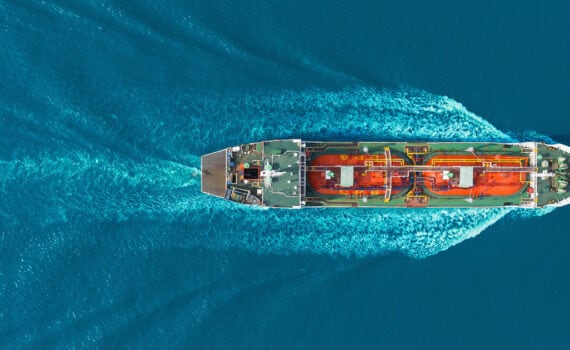From leadership to collaboration: shipping’s decarbonisation agenda picks up pace


While the costs and complexity of converting to cleaner fuels cannot be ignored, some industry leaders are acknowledging the challenges to drive the transition, with banks and financial institutions supporting them, found a keynote interview with Capt. Rajalingam Subramaniam, President & CEO, AET and COO of MISC Group conducted by Kheng Sin Chu, Managing Director and Regional Head of Shipping Finance, Standard Chartered, at the Marine Money Singapore Ship Finance Forum 2022.
As the world deals with an array of challenges – including volatile energy markets buffeted by Covid-191 and the ongoing conflict in Ukraine,2 and a rapidly warming planet3 – the case for decarbonisation and reducing our reliance on fossil fuels only grows stronger.
However, for the global push towards net zero emissions to succeed, and for all stakeholders to benefit from the opportunities afforded by the journey to a decarbonised future, they must all pull in the same direction and at the same time. This is especially true of the shipping industry which forms an integral part of the world economy. While some in the industry have moved faster than others, cooperation is growing among all players.
Singapore-headquartered AET has been on its decarbonisation journey for a few years, investing around US$2 billion since 2016 in new technologies and adopting transition fuels, such as LNG, that are available today to lower carbon emissions.
AET is the petroleum and product shipping arm of Malaysian maritime conglomerate MISC – of which Subramaniam is also Chief Operating Officer.
“But with the broad shoulders we have, we decided we’re going to make this leap as it was the right thing to do and we continue to do what’s right rather what’s easy and convenient,” he told attendees at the Marine Money Singapore Ship Finance Forum, adding that this decision had led to now operating seven dual-fuel vessels including the world’s first dual-fuel Very Large Crude Carrier (VLCC) that was delivered this year and four more under constructions. “As we consider what we are leaving for the next generation, we realise we need to be part of the solution.”
Moving further along the road to decarbonisation requires developing alternative fuels, including hydrogen, methanol and ammonia, and global supply networks to power the shipping sector’s vast fleet.
Ammonia, a zero-emission fuel, is considered a cleaner replacement for oil-derived marine fuels that currently power most ships, and “is one of the key pathways to achieving the 2050 decarbonisation agenda,” Capt. Raja said.
The good news is that progress towards an ammonia-powered future is underway. In April 2022, AET, Lloyd’s Register and Samsung Heavy Industries signed a Memorandum of Understanding to develop and construct two dual-fuel zero-emission VLCCs that can be operated with green ammonia and should see these vessels delivered by early 2026. That was announced under The Castor Initiative, a multinational effort focused on attaining zero-emission shipping.4
As the industry moves towards greater use of cleaner energy, it is at the same time encountering an overarching need for expertise.
“One of the key focus areas in the industry right now is on manpower and developing the right skill sets for shipping’s decarbonisation journey,” Kheng Sin said when discussing the maritime industry’s increasing focus on tackling environmental, societal and governance (ESG) challenges.
However, this goes further than simply hiring the talent that is suited for an organisation’s current needs, Capt Raja said. It also means seeking people who can pivot with a view to the future as the industry looks to meet its sustainability targets.
“Making employees ESG-competent is essential,” he said. “[And this requires] developing individuals’ skill sets through continuous training and internships in a way that benefits not just our organisation right now but also the industry long-term.”
While developing green fuels and ESG skills are crucial, the transition towards environmentally friendly shipping will require huge investment. One shipping CEO estimated recently that the industry needs US$1.5 trillion over 20-30 years to decarbonise the 99.9% of ships that still use fossil fuel.5
For his part, Subramaniam commended the banking and financial community for its actions, highlighting the uptake of the Poseidon Principles,6 a framework that aims to integrate lending decisions with lowering carbon emissions in shipping in line with global targets but commented that more needs to be done. He urged the financial community to differentiate investments into cleaner shipping and go beyond simply assessing credit risk to participate in sharing in the innovation risk as owners invest in new technologies to reduce their carbon footprint.
Because, as Kheng Sin noted: “The journey to decarbonisation is complex and expensive, and finance and investment are both critical to enable our clients to apply their decarbonisation strategies more meaningfully. With everyone stepping up to accelerate climate-friendly action, financiers have a central role to play in pursuing a sustainable future for maritime.”
This article is based on themes discussed during a panel at the Marine Money Singapore Ship Finance Forum 2022.
1 https://www.iea.org/topics/covid-19
2 https://www.wsj.com/articles/why-gas-prices-expensive-11646767172
3 https://news.un.org/en/story/2022/04/1115452
4 https://www.lr.org/en/latest-news/three-members-of-the-castor-initiative-ink-mou-for-zero-emission-vlccs/
5 https://asia.nikkei.com/Spotlight/Environment/Climate-Change/Decarbonizing-shipping-will-cost-1.5tn-over-20-30-years
6 https://www.poseidonprinciples.org/

Discover credit opportunities in the world’s hardest-to-reach markets with us.

Turning expertise into actionable insights. Explore our views on what to watch out for.